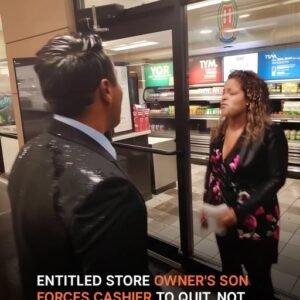Willow’s Market had been my second home for years, a cozy corner store filled with the comforting scent of fresh bread and cinnamon. Every morning, I unlocked the doors with a sense of purpose, taking pride in the little things—handwritten notes at the register, neatly arranged shelves, and warm greetings for customers.
That day, however, everything changed. A small figure in an oversized hoodie slipped through the door, moving hesitantly toward the sandwiches. Something about the child’s nervous energy caught my attention, but I continued tidying the register, pretending not to notice.
Then it happened—a quick rustle, a sudden movement, and before I could react, she darted toward the exit with a sandwich clutched in her hands. My heart pounded as I called out, “Excuse me!” but she was already gone.
As I bent to pick up fallen papers near the counter, something strange lingered in my mind. There had been a candle on that sandwich—a tiny birthday candle. That was no ordinary theft. It was an act of desperation, a quiet attempt to celebrate in the only way she knew how.
The moment haunted me. I couldn’t shake the thought of her wide, frightened eyes. That night, as I locked up the store, I made a decision: I wouldn’t let this be just another forgotten moment. I had to do something.
Days later, I began asking around about the girl. I learned her name was Katie, and she lived with her grandmother in a struggling part of town. Food was scarce, and she had been forced to steal just to survive. Her story shattered me.
That’s when I knew I had to act. I pitched an idea to Richard, the store owner—a community program that provided food assistance for those in need. He listened, skeptical but thoughtful. The idea of turning our little market into a place of refuge was unconventional, but necessary.
Resistance came from Logan, Richard’s son, who scoffed at the idea. “This is a business, not a charity,” he argued. But I stood firm. “This store is more than that—it’s a lifeline for people like Katie.” The words hung in the air, and for the first time, Logan had nothing to say.
As word spread, the community responded with unexpected warmth. Donations trickled in, volunteers stepped up, and Willow’s Market slowly transformed. Food baskets were prepared, struggling families found support, and no child would go hungry on our watch.
One evening, as I was closing up, I saw a familiar figure hesitating near the entrance. Katie. She looked up at me with uncertainty, still afraid. I knelt beside her, speaking softly. “You don’t have to run anymore.” This time, she didn’t.
The outreach program took root, changing not only Katie’s life but the entire community. Regular customers now left extra groceries at the counter for those in need. Local farmers donated fresh produce. A store that once only sold food now offered hope.
Logan, once reluctant, became one of our biggest supporters. One day, he simply admitted, “I was wrong.” The shift in his perspective was proof that change was possible—not just in businesses, but in hearts.
Months later, Katie returned—not as a scared girl, but as a child who had finally found stability. “I wanted to say thank you,” she whispered. My heart swelled. That small act of kindness had set off a ripple effect larger than I ever imagined.
Looking back, I realized the power of one moment. What started as a stolen sandwich had turned into something far greater—a movement of compassion, a lesson in resilience, and a reminder that sometimes, the smallest acts create the biggest change.
Today, Willow’s Market isn’t just a store. It’s a place where no one is invisible, where every person matters, and where a simple act of kindness has the power to change a life forever.
